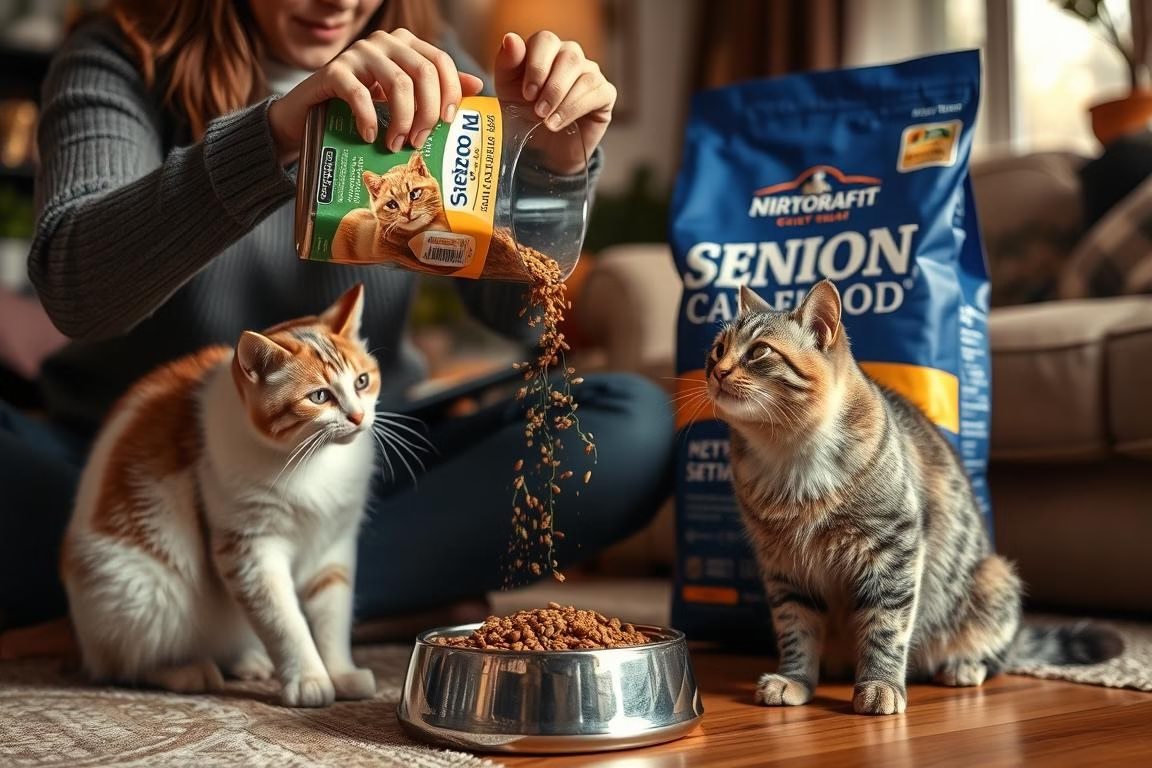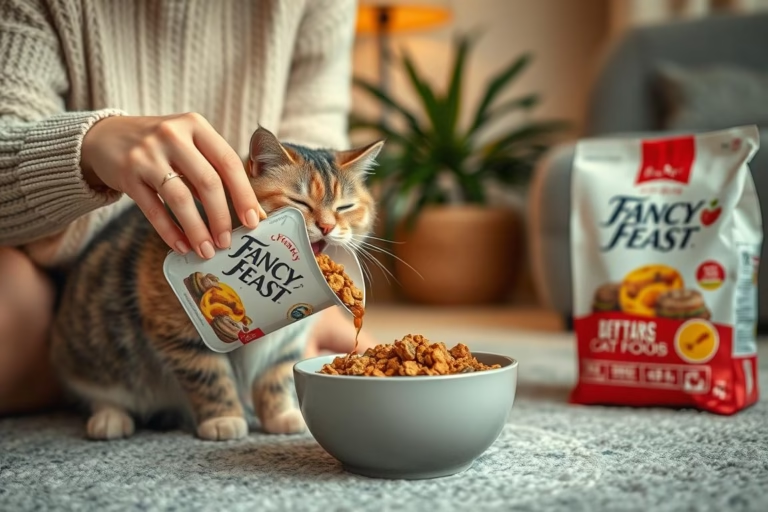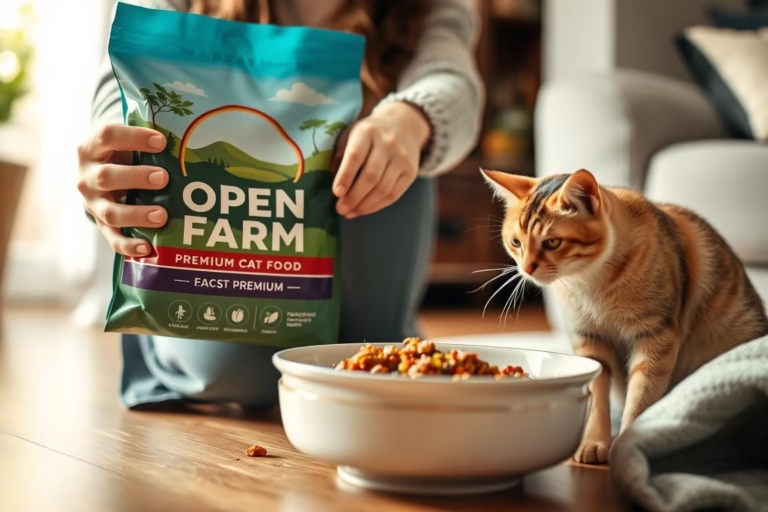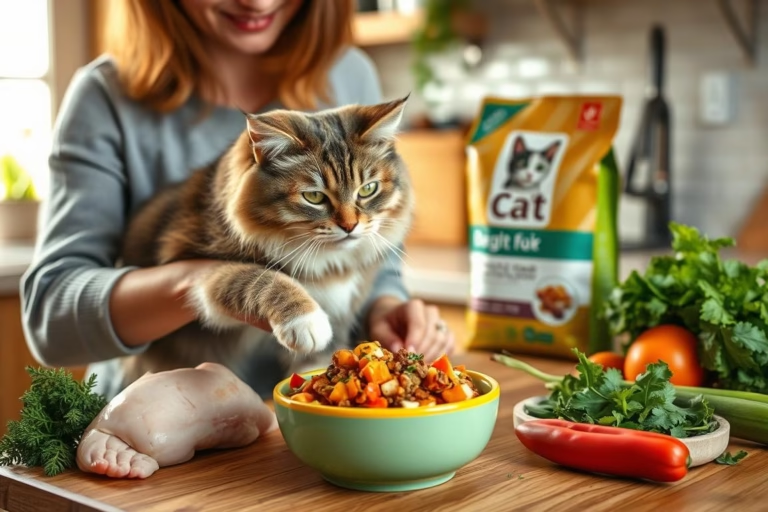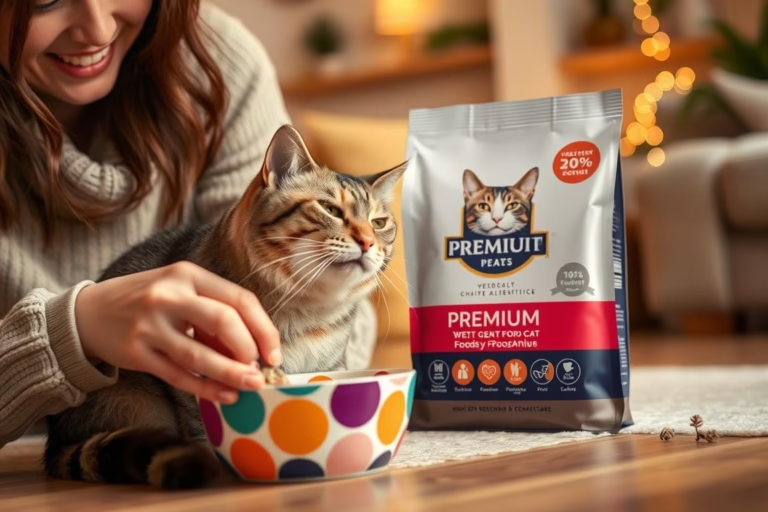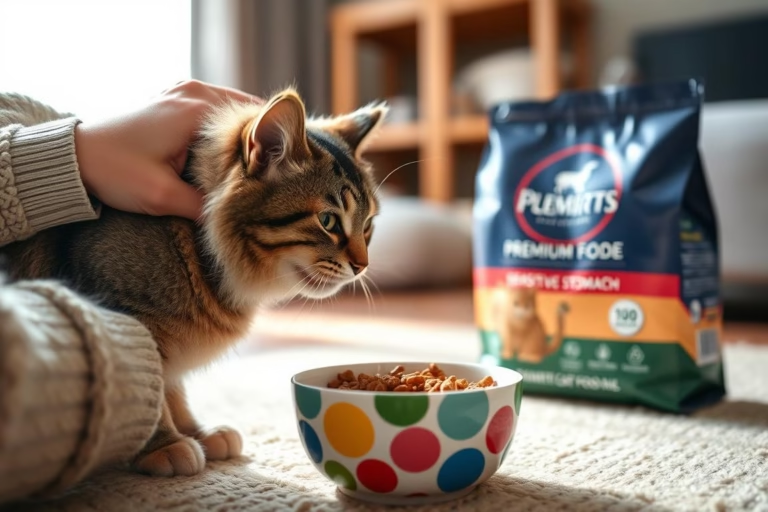Best Senior Cat Food: Nutritious Choices for Older Cats
As our beloved feline friends age, they need more than love and care. They require special attention, especially when it comes to their diet. Watching your cat grow older can be both touching and worrying.
Cats over 10 years old face special challenges. This is why quality senior cat food is so important. The right food helps them stay energetic and healthy.
Today, we have many diets made just for aging cats. Finding the best senior cat food means giving our cats the nutrients they need. A balanced diet helps them fight off health issues and stay well.
Table of Contents
Understanding the Nutritional Needs of Senior Cats
As cats get older, their diet needs change a lot. It’s important to find the right senior cat food to keep them healthy. Good nutrition helps fight off diseases like kidney problems and obesity. Giving your senior cat the right food can make them feel better and live longer.
Importance of Balanced Nutrition
A balanced diet is key for older cats to stay healthy. It helps them keep a good weight and work properly. As cats age, they might eat less and digest food differently. So, it’s crucial to give them food that’s packed with nutrients but easy to digest.
Key Nutrients for Aging Cats
To keep older cats healthy, focus on these nutrients:
- Protein – Helps keep muscles strong.
- Healthy Fats – Gives energy and keeps the gut healthy; older cats might have trouble digesting fats.
- Vitamins and Minerals – Boosts the immune system and bones; important for potassium, phosphorus, and B vitamins.
Many senior cat foods are made to meet these needs. They make sure your cat eats tasty, healthy meals. Talking to your vet and checking out guidelines can help you choose the best food.
Common Health Issues in Older Cats
Older cats often face certain health problems. These include:
- Chronic Kidney Disease (CKD) – Needs special diet changes.
- Arthritis and Joint Problems – Makes it hard for them to move around.
- Cognitive Dysfunction Syndrome – Affects the brain; needs specific nutrients for brain health.
Knowing about these issues helps cat owners take better care of their pets. The right food is key to managing these problems. It helps your aging cat live a happier, healthier life.
Cat Food Ingredients to Look For
Choosing the right food for senior cats is key to their health and happiness. Knowing what ingredients to look for helps pet owners make the best choices. This ensures their cats get the nutrients they need.
Protein Sources
Senior cats need high-quality protein sources to keep their muscles strong and energy up. Adult cats usually do well on 28-32% protein in their diet. Foods with real meat, fish, or poultry as the main ingredient are best. They provide the amino acids cats need for good health.
Healthy Fats
Healthy fats are crucial for energy and body functions. Senior cats need 14-20% total fat in their diet. Omega-3 and omega-6 fatty acids are important for skin and joint health. Fish oil and chicken fat are great sources of these fats.
Fiber and Its Benefits
Fiber is important for digestive health. It helps with bowel movements and weight management. Peas and pumpkin are good sources of fiber. They help prevent constipation and keep digestion healthy.
Vitamins and Minerals
Vitamins and minerals boost the immune system and overall health of senior cats. Antioxidants like Vitamin E and C help with immune function and joint health. Look for senior cat food ingredients with calcium and phosphorus for strong bones and a healthy heart. These nutrients are vital for a long, healthy life.
| Ingredient Type | Examples | Benefits |
|---|---|---|
| Protein Sources | Chicken, Salmon, Turkey | Maintains muscle mass, energy |
| Healthy Fats | Fish Oil, Chicken Fat | Supports skin, joint health |
| Fiber | Pumpkin, Peas | Promotes digestion, weight management |
| Vitamins & Minerals | Vitamin E, C, Calcium | Boosts immune system, bone health |
Analyzing Cat Food Nutrients
Choosing the right food for senior cats is key. Understanding the nutritional label helps pet owners make smart choices. It shows the important nutrients for older cats’ health.
Reading the Nutritional Label
The nutritional label lists important details like protein, fat, and fiber. Senior cats need more protein, about 20% of their diet. Look for named protein sources for better quality.
Guaranteed Analysis Breakdown
The guaranteed analysis section is crucial. It shows the minimum amounts of vital nutrients, including:
- Protein: Keeps muscles strong, vital for older cats.
- Fat: Gives energy, but older cats may digest it less well.
- Fiber: Helps with digestion, important for senior cats.
Knowing these numbers ensures the food meets senior cats’ needs.
Ingredient Quality Assessment
Checking ingredient quality is as important as nutrient analysis. Avoid foods with fillers and artificial additives. They can harm health. Choose foods with whole, recognizable ingredients for better nutrition.
The Benefits of Senior Cat Food
Choosing the right food for senior cats offers many advantages. It meets their special nutritional needs. Senior cat food helps with weight management, joint support, better digestion, and more energy. Each benefit is key to keeping older cats healthy.
Weight Management
Senior cat food often focuses on weight management. It has fewer calories to stop obesity, a common problem as cats get older. High-quality protein helps keep muscles strong while controlling calories, keeping your cat fit and healthy.
Joint Health Support
Joint support is a big part of senior cat food. Older cats often have joint pain. Their diet should include glucosamine and omega fatty acids. These help ease arthritis symptoms, making it easier for them to move and feel comfortable.
Improved Digestive Health
Senior cat food also improves digestion. It has more fiber, which helps digestion and prevents stomach problems. This helps aging cats digest fats and proteins better, keeping their digestive system stable.
Enhanced Energy Levels
As cats age, their energy levels can drop. The right senior cat food boosts energy. It has balanced carbs for energy for daily activities. This helps improve your cat’s quality of life.
| Benefit | Description |
|---|---|
| Weight Management | Low-calorie ingredients to prevent obesity while maintaining muscle mass. |
| Joint Health Support | Nutrients like glucosamine to alleviate arthritis symptoms and support mobility. |
| Improved Digestive Health | Higher fiber content to aid digestion and reduce gastrointestinal issues. |
| Enhanced Energy Levels | Balanced carbohydrates for sustained daily energy, improving overall vitality. |
Recommended Cat Breeds for Senior Cat Food
Choosing the right senior cat food is crucial for certain breeds. Each breed has its own health needs and lifespan. Knowing these helps in giving the best nutrition.
Breeds That Benefit Most
Some cat breeds are perfect for senior cat food. They live longer and may have health issues. Here are a few:
- Balinese – Lifespan: 15-22 years, known for high energy levels.
- Bombay – Lifespan: Up to 20 years, moderate energy, low grooming needs.
- British Shorthair – Lifespan: 14-20 years, low energy, simple care.
- Havana Brown – Lifespan: About 15 years, moderate energy, easy to care for.
- Ragdoll – Lifespan: 15-17 years, moderate energy, affectionate nature.
- Siamese – Lifespan: Around 15 years, lively and sociable.
Considerations for Different Breeds
Each breed has its own dietary needs. For example:
- Breeds like the Russian Blue do well on low-care, high-quality food.
- The gentle Scottish Fold needs a moderate energy diet.
- Short-haired breeds need less grooming, making them great for seniors.
- Affectionate breeds, like the Birman, might like more protein in their food.
Choosing the right senior cat food brand is key. It ensures your cat gets the right nutrition. This helps them live a healthier, happier life.
Dosage Chart for Different Breeds and Ages
Feeding your senior cat right is key to their health. Knowing their nutritional needs based on age and breed is important. A cat food dosage chart helps owners figure out the right amount to feed. Remember, every cat is different, so feeding guidelines must be tailored to their needs.
General Guidelines for Feeding
First, check your cat’s weight and how active they are. Cats usually need 25 to 35 calories per pound of body weight each day. But, their calorie needs can change a lot, sometimes by 50%. Active cats burn more calories, so their diet needs to be adjusted.
Age-Specific Dosage Recommendations
Kittens need more calories to grow and develop. Senior cats, aged 7 to 8 years, need fewer calories to stay healthy. Adjust their food based on their life stage to meet their nutritional needs. For specific advice, check a reliable source with a dosage chart for different breeds and ages.
Adjustments for Health Conditions
Health issues like obesity change what your cat needs to eat. About 60 percent of cats in the U.S. are overweight or obese. To help, you might need to cut calories and add fiber for better digestion. Cats with kidney disease might need special diets with less protein. Always talk to a vet to adjust their food based on their health.
Top Senior Cat Food Brands
Choosing the right food is key for your senior cat’s health. Many senior cat food brands offer high-quality ingredients. They provide balanced nutrition for older cats. Reading reviews can help you make a good choice.
Overview of Leading Brands
Several brands are top choices for senior cat food. Here are some:
- Royal Canin – Offers tailored recipes for older cats.
- Hill’s Science Diet – Focuses on a balanced diet for a strong immune system.
- Purina Pro Plan – Provides high-quality protein and essential nutrients.
- Wellness CORE – Offers grain-free options and nutrient-dense food.
- Blue Buffalo – Suits sensitive stomachs with minimal-ingredient wet food.
Comparison by Price and Quality
Price is a big factor in choosing senior cat food. Here’s a table comparing prices and quality:
| Brand | Price per Pound | Quality Rating |
|---|---|---|
| Royal Canin | $5.50 | 4.8/5 |
| Hill’s Science Diet | $4.75 | 4.7/5 |
| Purina Pro Plan | $3.90 | 4.5/5 |
| Wellness CORE | $6.00 | 4.9/5 |
| Blue Buffalo | $5.25 | 4.6/5 |
User Ratings and Reviews
User feedback is important for judging a diet’s success. Customers often talk about how tasty and healthy their cats feel. They mention better digestion, more energy, and fewer health problems.
To learn more about cat medications, check out this resource. Reading both positive and negative reviews helps tailor a diet for your senior cat’s needs.
In-depth Reviews of Popular Senior Cat Foods
Choosing the right food for senior cats is crucial as their nutritional needs evolve. This section dives into detailed reviews, highlighting popular senior cat foods, their ingredients, and the unique benefits they offer.
Brand A Review: Ingredients and Nutrients
Smalls offers five tailored recipes for senior cats, with flavors like Fish (cod and salmon) and Bird (chicken). Their meals have a smooth texture and high moisture content. This makes them a top choice in senior cat food reviews.
These recipes are grain-free and rich in protein. They include:
- Fish: Cod and Salmon
- Bird: Chicken
- Other Bird: Turkey
- Pig: Pork
- Bird & Fish: Chicken and Salmon
Smalls’ unique formulation also includes low carbohydrates. This supports aging felines. Ground and Pulled textures are available for the Bird and Other Bird offerings, providing options based on dietary preferences.
Brand B Review: Health Benefits
Raised Right is known for its fresh recipes with chicken and turkey and pumpkin for nutritional benefits. Their fresh cat food stays fresh in the fridge for up to six days. This brand is great for older cats because it provides high-quality protein that is easy to digest.
Open Farm offers over 15 different proteins, such as chicken and lamb. This makes it a versatile option in senior cat food reviews.
Brand C Review: Customer Feedback
User satisfaction is key when choosing senior cat foods. Hill’s Science Diet Adult 7+ is praised for addressing heart and kidney health. It has 27% crude protein and 16% crude fat, with 500 kcal per cup.
Purina ONE True Instinct is also recognized for using real chicken and natural ingredients. Customer reviews often highlight how these formulas have positively impacted their cats’ health and vitality.
| Brand | Recipe | Crude Protein | Crude Fat | Calories |
|---|---|---|---|---|
| Smalls | Fresh Smooth Cow | 5% | 12% | 200 kcal/4.1 oz |
| Iams ProActive | Healthy Senior Dry | 34% | 17% | 399 kcal/cup |
| Fancy Feast | Beef Feast Classic Pate Senior 7+ | 5% | 5% | 95 kcal/can |
| Hill’s Science Diet | Adult 7+ Chicken Recipe Dry | 27% | 16% | 500 kcal/cup |
| Purina Pro Plan | LiveClear Formula Dry | 38% | 17% | 604 kcal/cup |
| Nulo Freestyle | Senior Grain-Free Dry | 38% | 14% | 431 kcal/cup |
| Royal Canin | Aging 12+ Thin Slices in Gravy | 9% | 2.5% | 71 kcal/can |
Comparing Senior Cat Food: Brand vs. Brand
Choosing the right food for senior cats is key. We compare top-rated wet and dry cat foods. We look at price, nutrients, and what customers say. This helps cat owners make better choices.
Price Comparison
| Brand | Type | Price per Unit |
|---|---|---|
| Royal Canin Aging 12+ Loaf in Sauce | Wet Food | $2.99 per 5.8 oz |
| Hill’s Science Diet Adult 7+ Savory Chicken Entree | Wet Food | $1.79 per 5.5 oz |
| Wellness Complete Health Age Advantage Plus Tuna and Salmon Entree | Wet Food | $2.39 per 5.5 oz |
| Hill’s Science Diet Adult 11+ Chicken Recipe | Dry Food | $2.50 per lb |
| Nulo Freestyle Senior Alaska Pollock Recipe | Dry Food | $3.00 per lb |
| Purina Pro Plan Prime Plus Chicken and Rice Formula | Dry Food | $2.20 per lb |
Nutrient Profiles
| Brand | Protein (%) | Fat (%) | Calories (per serving) |
|---|---|---|---|
| Royal Canin Aging 12+ | 12 | 2.5 | 126 |
| Hill’s Science Diet Adult 7+ | 11 | 3.5 | 100 |
| Wellness Complete Health Age Advantage | 10 | 3 | 110 |
| Hill’s Science Diet Adult 11+ | 21 | 17 | 420 |
| Nulo Freestyle Senior | 30 | 14 | 380 |
| Purina Pro Plan Prime Plus | 30 | 14 | 400 |
Customer Satisfaction Ratings
- Royal Canin Aging 12+: 4.5 stars – Highly rated for palatability and hydration.
- Hill’s Science Diet Adult 7+: 4.2 stars – Known for digestive health and energy maintenance.
- Wellness Complete Health Age Advantage: 4.6 stars – Customers praise its natural ingredients.
- Hill’s Science Diet Adult 11+: 4.3 stars – Favored for its high protein and low carb content.
- Nulo Freestyle Senior: 4.8 stars – Celebrated for its innovative formula and flavor.
- Purina Pro Plan Prime Plus: 4.4 stars – Appreciated for enhancing the quality of senior cats’ diet.
Special Considerations for Feeding Senior Cats
Feeding senior cats needs special care as they age. It’s not just about changing food brands. Their nutritional needs change a lot.
Senior cats often have less muscle and move less. This means they need different food to stay healthy.
Transitioning to Senior Food
Switching to senior cat food should be done slowly. Quick changes can upset their stomach or make them lose interest in food. It’s best to take a week or more to make the change:
- Day 1-2: Mix 25% senior food with 75% current food.
- Day 3-4: Adjust to 50% senior food and 50% current food.
- Day 5-6: Increase to 75% senior food and 25% current food.
- Day 7: Serve 100% senior cat food.
This slow transition helps the cat adjust and keeps their digestive system healthy.
Monitoring Health Changes
Watching your cat’s behavior and health closely is key. Changes in appetite, weight, and activity can show how they’re doing on their new diet. Dental issues and less sense of taste or smell can also affect their appetite.
Keeping an eye on these signs helps you make the right food choices for them.
Consulting with Your Veterinarian
Regular vet visits are crucial for senior cats. Cats over 11 should see the vet twice a year. This helps catch health problems early.
The vet can check on your cat’s health and suggest the right food. They might recommend special senior cat food for any health issues. Getting advice from a vet ensures your cat gets the right nutrition.
How to Choose the Best Senior Cat Food
Choosing the right food for your aging cat is important. Each cat’s needs are different. It’s key to make informed choices to ensure your pet gets the best nutrition for a healthy life.
Factors like ingredient quality, nutritional content, and health circumstances are crucial. They help in selecting the right senior cat food.
Factors to Consider
When picking senior cat food, think about these factors:
- Nutritional Content: Look for high-quality protein and essential nutrients. Older cats need specific diets to keep their muscles strong.
- Ingredient Quality: Avoid junky fillers. Choose food with pure, tailored nutrition for your senior cat.
- Digestibility: Opt for foods with digestible ingredients. This helps with sensitive stomachs and digestive health.
- Brand Reputation: Choose trusted brands known for their senior cat food recommendations.
Personalized Nutrition
Every senior cat is different. Their needs depend on breed, health, and lifestyle. For example, cats with dental issues might do better with wet food like Limited Ingredient Diet Rabbit Au Jus for Cats.
On the other hand, some cats prefer dry food. It helps with dental health but needs enough water. Think about your cat’s specific needs when picking their food.
Feedback from Other Cat Owners
Getting advice from other cat owners is very helpful. Online forums, reviews, and discussions share real experiences. They help you find out which brands and formulas work best.
Many recommend minimal-ingredient wet cat food. It’s great for picky eaters and has fewer allergens.
| Brand | Type | Key Benefits |
|---|---|---|
| Limited Ingredient Diet Rabbit Au Jus | Wet Food | Highly digestible, safe for sensitive stomachs |
| Limited Ingredient Diet Duck Pâté | Wet Food | Minimal ingredients, proven for picky pets |
| Limited Ingredient Diet Turkey Pâté | Wet Food | Supports hydration, prevents urinary issues |
Homemade vs. Commercial Senior Cat Food
Choosing between homemade cat food and commercial senior cat food is a big decision. Each option has its own benefits and challenges. Pet owners need to think carefully about what’s best for their cats.
Benefits of Homemade Diets
Homemade cat food lets you tailor meals to your cat’s tastes and health needs. It’s great for cats with allergies or special health issues. You can save money by using fresh, homegrown ingredients.
But, making homemade meals can be tricky. You need to make sure the recipes are balanced and safe. A vet nutritionist can help avoid any nutritional problems.
Challenges in Food Preparation
While homemade meals have perks, they can be hard to make. They might not have all the nutrients your cat needs. The USDA warns about the risk of bacteria like Salmonella in raw ingredients.
It can also be hard to find the right ingredients and balance the meals. This can be stressful for pet owners. Regular vet visits are key to keeping your cat healthy on a homemade diet.
When to Use Commercial Options
Commercial senior cat food is a convenient and reliable choice. It’s made with quality control and meets global nutrition standards. Many vets recommend it for its complete nutrition.
Commercial food comes in different forms like kibble, pate, or freeze-dried. It’s easy for busy owners to use. It’s a good option for new pet owners or those who want a simple diet.
| Feature | Homemade Cat Food | Commercial Senior Cat Food |
|---|---|---|
| Customization | High | Low |
| Nutritional Completeness | Variable | Guaranteed |
| Preparation Time | High | Minimal |
| Safety Control | Requires Care | Comprehensive |
| Cost Efficiency | Potentially High | Moderate |
Common Myths About Senior Cat Food
Many cat owners believe wrong things about senior cat food. This can stop them from giving their older cats the best food. It’s key to know the difference between myths about senior cat food and senior cat food facts. This way, they can make better choices for their cats.
Myths vs. Facts
Knowing the truth about senior cat food can clear up many myths. Here are some common misconceptions:
- Myth: Dry food helps control dental health.
- Fact: Studies show that the benefits of dry food in reducing plaque and tartar buildup in cats are minimal.
- Myth: All cats need grain-free diets.
- Fact: Cats rarely develop specific grain allergies, so grain-free diets are not necessarily better for them.
- Myth: Cats can effectively regulate their food intake.
- Fact: Cats often do not self-regulate their food intake and can overeat if given free access to food.
- Myth: Homemade diets are the best option for senior cats.
- Fact: Homemade diets must be carefully planned to avoid nutrient deficiencies or excesses.
- Myth: Cats can thrive on vegetarian diets.
- Fact: Cats are obligate carnivores, needing nutrients found primarily in animal tissues. Vegan or vegetarian diets can lead to severe health issues.
- Myth: Older cats can easily digest milk.
- Fact: Most adult cats are lactose intolerant and cannot digest milk properly.
Addressing Misconceptions
It’s important to clear up these misconceptions for senior cats’ health. Here are a few more points to consider:
- Toxic Foods: Many human foods, including onions, garlic, chocolate, and xylitol, are toxic to cats and can lead to health problems.
- Longevity: Cats live much longer now, with many reaching into their late teens and early twenties.
- Age Classification: According to the American Association of Feline Practitioners, older cats are classified as middle-aged (7 to 10 years), senior (11 to 14 years), and geriatric (15 years and older).
- Weight Management: Aging leads to lower energy needs and a tendency to gain fat and lose muscle, which can start around 7 years old.
- Diet Adjustments: Cats may require tailored diets addressing chronic health issues at older ages, with some needing more calories to maintain ideal body condition.
By debunking these myths, cat owners can better meet their pets’ needs. Choosing the right diet is key to helping aging cats stay healthy. Knowing senior cat food facts helps owners support their cats’ long, healthy lives.
The Importance of Regular Vet Check-ups
Routine vet visits are key for senior cats’ health. Knowing when and how often to go helps a lot. These visits catch diseases early and keep your cat healthy as they get older.
Timing and Frequency
Senior cats need vet visits at least once a year. If they have health issues, they might need to go more often. Going twice a year is often suggested.
At these visits, vets check blood pressure, blood, and urine. They look for problems like organ issues, obesity, and dental disease. Neutering is also important to prevent health problems like cancer.
Discussing Diet with Your Vet
Talking about your senior cat’s diet is crucial at vet visits. Vets can suggest the best food for your cat’s needs. They help with weight issues, common in indoor cats.
Vet visits are important for noticing health changes, like memory loss or mobility problems. They help improve your cat’s life. Use these visits to talk about your cat’s diet and any needed changes, as explained in this resource.
Conclusion: Finding the Best Fit for Your Senior Cat
As our feline friends get older, their diet needs change a lot. It’s key to give them the best senior cat food that meets their needs. A good diet for older cats should have more protein to keep their muscles strong. It should also have the right vitamins and minerals for their health.
Look for brands that offer special diets for senior cats. Now Fresh has recipes full of nutrients that are great for older cats. When changing your cat’s food, start with a mix of 25% new and 75% old food. This helps avoid stomach problems. Also, eating smaller meals more often can help keep them healthy and interested in food.
Always talk to your vet before picking food for your senior cat. They can suggest the best food based on your cat’s health and diet needs. Choosing high-quality food will help keep your cat healthy and happy in their golden years.

